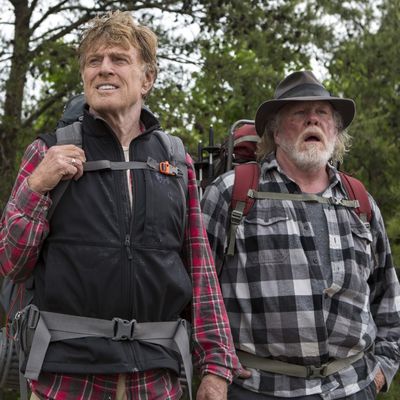
The lax, lame A Walk in the Woods is a road movie without a road, a journey of self-discovery without discovery, and a tale of friendship without any chemistry. Based on travel writer Bill BrysonÔÇÖs 1998 best-seller about his attempts to hike the Appalachian Trail in his late 40s, it stars two far older actors whose energies can either be complementary or mismatched: The always understated Robert Redford plays Bryson, and Nick Nolte, one of our most wonderful scenery-chewers, plays Stephen Katz, BrysonÔÇÖs gruff, shaggy old friend from Iowa who is the only one to answer the writerÔÇÖs call for a traveling companion. Together, these two men ÔÇö one an intellectual who is feeling the creeping approach of his own mortality, the other a walking human disaster zone ÔÇö spend months attempting to make their way up the trail, which runs from Georgia to Maine.
That could be the setup for a sensitive story about age, friendship, determination, you name it. But for whatever reason, the film settles instead for a tonal muddle of broad, crass comedy and wan observations. At one point, Bryson and Katz hitch a ride with a couple who are about to get married; the woman goes down on the man while he drives and guzzles from a whiskey bottle. Later, Katz attempts to have a fling with an overweight woman he meets at the laundromat, and there are at least three jokes about her panty size. ThereÔÇÖs also a collapsing bunk-bed gag, because why even bother to finish this sentence.
Everything, it seems, is being played for laughs  which would have been okay if the laughs werent just lowest-common-denominator gags executed with little energy or conviction. Director Ken Kwapis is a journeyman whose stock-in-trade seems to be mild, unremarkable programmers, but he also once made one of the strangest road movies of all time, the 1988 Cyndi LauperJeff Goldblum vehicle Vibes. That wasnt a good movie, but one wishes hed reconnected to some of its loony spirit, just to give this one the semblance of a pulse.
The dialogue occasionally attempts to play off the notion of age, disappearance, and rebirth. The erudite Bryson makes observations about geologic time, and about how ÔÇ£the world is being reborn from below while itÔÇÖs withering away on top.ÔÇØ He discourses on the ÔÇ£poor, unsuspecting American chestnut,ÔÇØ trees that grew so tall and thrived for so long before nearly going extinct due to a fungus. Katz, however, doesnÔÇÖt think about such things: ÔÇ£I donÔÇÖt get bogged down in minutiae,ÔÇØ he rasps. ÔÇ£IÔÇÖm above the details.ÔÇØ
As an actor, Nolte doesnÔÇÖt get enough credit for his transformative powers. Despite his burly presence and low voice, heÔÇÖs always had a surprising ability to modulate and shape-shift. (Think of how physically and sonically different his performances are in LorenzoÔÇÖs Oil, Affliction, The Thin Red Line, and Cape Fear.) Here, heÔÇÖs playing a recovering but unrepentant alcoholic. (ÔÇ£I spent half my life getting drunk and chasing pussy,ÔÇØ he says at one point. ÔÇ£The other half, I wasted.ÔÇØ) And his voice comes out in a broken squawk, like Daffy Duck taking a dump. Is this a performance, or is it simply where Nolte has landed after years of hard living? Does it matter? His aura suits the role and the movie.
But nothing else works. Nothing develops in A Walk in the Woods┬áÔÇö not the people, not the journey. One doesnÔÇÖt expect Wild, exactly, but when a character talks about how exhausted and strained they are by the trail, it might have been nice for us as viewers to see it in some way. Instead, the spaces of the Appalachian Trail shift between nondescript motels and diners and parking lots and occasional blandly picturesque landscapes. One doesnÔÇÖt sense a connection between the characters and the world around them. At one point, Bryson and Katz gaze out in awe at the Smoky Mountains; the shot looking at them feels like it was filmed in someoneÔÇÖs backyard, while what theyÔÇÖre seeing is a long, high traveling angle that doesnÔÇÖt feel like anyoneÔÇÖs point of view. Maybe thatÔÇÖs the idea: to highlight their alienation from nature. Or maybe this is just exceptionally lazy filmmaking.


